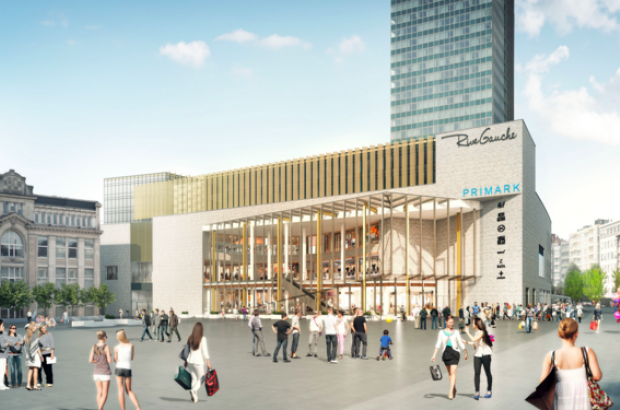- Daily & Weekly newsletters
- Buy & download The Bulletin
- Comment on our articles
Rive Gauche: Revitalising downtown Charleroi with a new shopping complex
Charleroi is counting down to the grand opening of its long-awaited shopping centre Rive Gauche on 9 March. The ten-year project is at the heart of a major urban regeneration project for a city that has epitomised postwar economic depression in the region. “We are happy to arrive at the end of what has been a long debate,” said city mayor Paul Magnette at a press conference held 15 days before the opening.
“This is more than a shopping centre, it’s a coherent urban project that will revitalise the whole of the lower town. Combined with the left side business park, it will bring the city alive with a series of complementary activities,” he added.
Comprising 90 shops, a four-star hotel, restaurants, apartments and underground parking, the 39,000m2 shopping mall has been carefully integrated into the urban fabric of the once-blighted lower town. It boasts seven entry and exits, bay windows, skylights and incorporates the listed Neoclassic Passage de la Bourse.
The mall opens with a fanfare: four days of festivities entitled La fête pour tous, starting on 9 March at 9.00. The public is invited to an open-air free breakfast and official inauguration by Magnette and the property developer in Place Verte, the new name for Place Albert I. Guided tours and entertainment continue in the shopping centre (open exceptionally until 21.00) followed by fireworks, a sound and lift show and a DJ set in the evening. Rive Gauche will also be open on Sunday 12 March from 10.00-19.00. Visitors are encouraged to use local transport. Charleroi Sud train station, with tram, bus and metro connections, is a five-minute walk from the new facilities.
For the long-suffering local community, the near-completion of the project is an occasion to celebrate. Over the past three years, the lower town has been a giant building site. While some parts of the town, such as the Inno department store have undergone a facelift, others have been demolished, including the 20th-century Collonades landmark. After the inauguration of the shopping mall, the hotel and residential areas will be completed by the summer.
Olivier Callebaut from architect firm DDS Architects explained how the aim was for the shopping complex to be in dialogue with the town: “The idea was not to mimic the surrounding architecture. It was a complicated project, using different volumes and materials, including local brick, metal, copper and aluminum,” he said.
Callebaut led one of the guided tours around the site. Kitted out with hard hats and Rive Gauche umbrellas to protect from any falling debris and driving rain, we were steered first around the site – a hive of activity with teams of workers and a battery of heavy machines and equipment. Entering the bowels of the enormous building via the underground parking ramp, it was difficult to imagine how the site could be open to the public in two weeks’ time. One of the site foremen confessed that there may well be a remaining slick of wet paint on the first day of business.
As one of the architects behind the design, Callebaut admits that it was a challenging commission. Much of the sleek and contemporary interior is curved, adding to the build time. More mundane details such as security exits have been given a design finish. As we stand in the glass-walled atrium overlooking Place Verte, he points out how the building has been aligned to existing streets, how part of it superimposes the square. Despite the dismal grey skies, light fills the space and the eye is drawn to the panoramic view as much as the interior contours and shop facades.
In fine weather, all of the entrance doors will be raised to allow a further blending of indoor and outdoor space and a thoroughfare will remain open day and night even when stores are closed.
For Wallonia’s largest commune, one of the most important projected figures for Rive Gauche is the 700 new jobs it will create. The project of Société Saint Lambert Promotion, a partnership between IRET Development and Brussels South Invest, has succeeded in attracting familiar brands, including Primark, Zara, Berscha, H&M, Kiabi and C&A.














